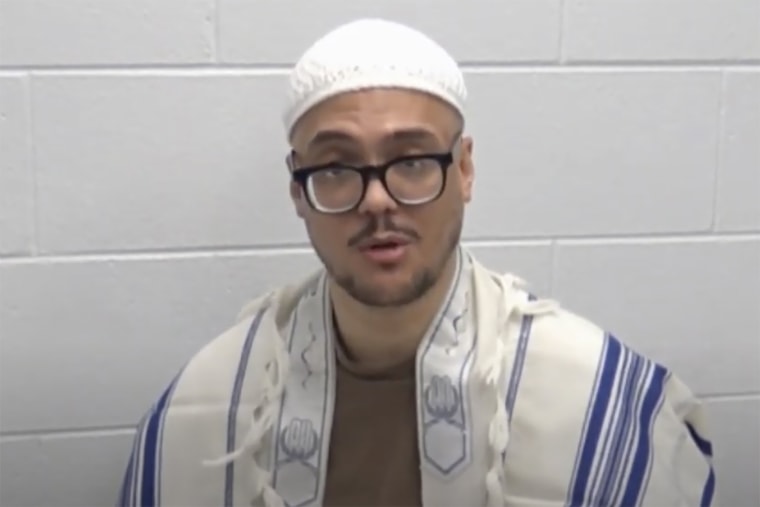A Black man was executed by the federal government Thursday for a crime he committed at age 19, even though his attorney said prosecutors used inflammatory racial stereotypes during the trial 20 years ago to land her client on death row.
The man, Christopher Vialva, 40, was executed Thursday evening at the federal prison in Terre Haute, Indiana. The Vigo County, Indiana, coroner pronounced him dead at 6:46 p.m., according to a statement from the Federal Bureau of Prisons.

He was the first Black inmate put to death since the Trump administration's revival of federal executions this year.
Vialva was sentenced to death in the 1999 killing in Texas of Todd and Stacie Bagley, a white couple who were youth ministers. There were 11 white jurors and one Black juror in the 2000 federal trial, said Vialva's attorney, Susan Otto.
Prosecutors portrayed Vialva "as if he were the leader of a violent and well-organized street gang," Otto said.
"Of course, in the year 2000, the theme of the super predator, that there were these kids that just marauded through our communities wreaking havoc, was a very powerful and very convincing narrative," she said.
Otto said there was no evidence that Vialva was a leader or a real member of the so-called 212 PIRU Bloods gang. She said that he and his friends encountered the couple after Vialva was kicked out of his mother's home and that, having nowhere to go, the group made a plan to rob someone.
"This is a product of a person, a child, with very disorganized thinking, in a full-on panic, surrounded by a bunch of other kids whose ideas are just as bad as his," she said.
Otto said it was a very convincing narrative to frame to the jury that Vialva and Brandon Bernard, his co-defendant, who is also Black, were part of a violent gang. Bernard was also sentenced to death; his execution date has not been set, according to the Federal Bureau of Prisons.
"I think it had a very strong impact on the jury's decision to conclude that Christopher was a mad dog that needed to be put down," she said. "I think, as time has proven, nothing could be further from the truth."
Otto pointed to what she said was Vialva's growth as a person during his time in prison, saying he studies a Messianic faith and has "overwhelming remorse" for his actions.
Otto also said that Vialva was developmentally about three years younger at the time of the killings and that when she met him in 2003, he was still struggling to read.
She had called on President Donald Trump to grant him clemency and commute his sentence to life in prison without the possibility of parole.
"Christopher is simply asking him to spare his life," she said.
More than 46 percent of the 56 inmates on federal death row are Black. Black people make up about 13 percent of the U.S. population.
In a recent op-ed for Bloomberg Law, Jason Chein, a professor of psychology at Temple University, said Vialva's then-pending execution ignores what "the last 20-plus years of research has taught us about the developing brains of teenagers and adolescents."
"Science suggests that no person of this age should be eligible for capital punishment," he wrote.
Chein said told NBC News on Thursday, "This is a really terrible thing that this individual has been accused of and seems to be admitting guilt to and was convicted of."
But "it's due time for us to really look closely at whether capital punishment can be appropriate for someone who hasn't reached the age of full maturity in their brain, and I'd argue it can't," he said.
Chein said that while a 19-year-old knows the difference rationally between right and wrong, study after study has shown that when you add emotional arousal or social conditions that change the way the brain makes decisions, "it looks like the brain of a younger individual rather than that of a fully matured adult."
"The way their brain processes information in those situations tells us that they don't yet have the full adult capacity as they're making those decisions," he said.
According to the Justice Department, Todd and Stacie Bagley were killed in Fort Hood, Texas, in 1999 after having agreed to give Vialva and two of his friends a ride in their car.
Vialva pulled out a gun and forced the couple into the trunk, and the group of teenagers drove around for a few hours, stopping to try to withdraw money from the Bagleys' bank account and to pawn Stacie Bagley's ring, according to the Justice Department. Vialva eventually parked at the site of the Fort Hood military reservation and shot the couple while another man set the car on fire, according to the Justice Department.
The Trump administration restarted federal executions in July after a 17-year pause, beginning with six at the federal prison in Terre Haute. The Justice Department did not immediately respond to request for comment.
